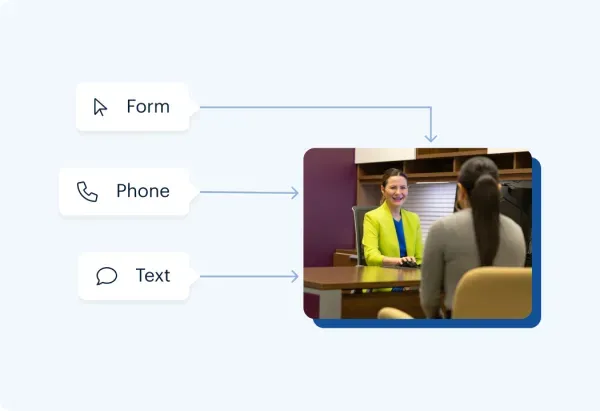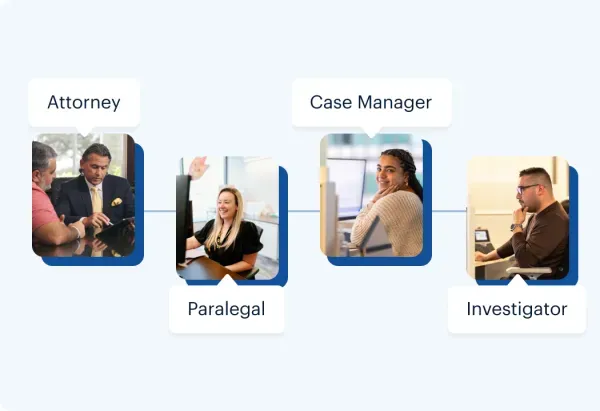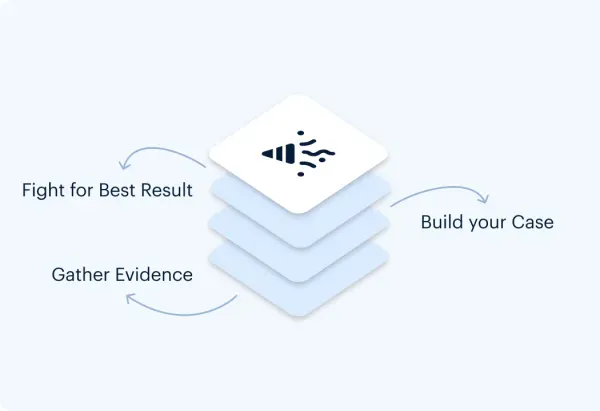Cases will be handled by attorneys licensed in the local jurisdiction. Cases may be associated with, or referred to, other law firms as co-counsel or referral counsel. Results may vary depending on your particular facts and legal circumstances. The attorney featured above is licensed in Florida. For a full list of attorneys in your state please visit our attorney page.
CHARLOTTE WORKERS’ COMPENSATION LAWYERS
Getting hurt on the job can be physically and emotionally overwhelming. From missed paychecks to mounting medical bills, injured workers often face more than just a recovery; they face a system that doesn’t always make things easy. Workers’ compensation laws are designed to protect employees; however, understanding your rights can be complex.
Cases will be handled by attorneys licensed in the local jurisdiction. Cases may be associated with, or referred to, other law firms as co-counsel or referral counsel. Results may vary depending on your particular facts and legal circumstances. The attorney featured above is licensed in Florida. For a full list of attorneys in your state please visit our attorney page.
What Are the Workers' Compensation Laws in Charlotte, NC?
Charlotte, North Carolina, is the 16th most populated city in the U.S. and is ranked as one of the nation's fastest-growing metro areas. After New York City, Charlotte has the most extensive banking center in the country, with Bank of America headquartered there, as well as Wells Fargo's home base for the east coast division. Other notable employers are Duke Energy, Atrium Health, Novant Health, Amazon, Passport, Lending Tree, and Lowes.
Although workers' compensation laws in Charlotte, NC, are generally not among the best nor the worst in the country, it does provide compensation and medical coverage for injured workers. Workers' compensation was created with the intention of providing for workers injured on the job without having to prove negligence on behalf of the employer. In return, an employer can't deny benefits if the worker gets hurt because of fault on the worker's behalf. Read on to understand more about workers' compensation laws in Charlotte, NC, and what to do if you're having a dispute with your employer.
150,000+ Five Star Reviews
The reasons why clients trust Morgan & Morgan.
Results may vary depending on your particular facts and legal circumstances. Based on select nationwide reviews.
Our Results
How It Works
Unsure what to do next? With 35 years of experience, our personal
injury lawyers will guide you every step of the way.

Contact Us 24/7 - It’s Free
Start your claim

Meet your dedicated attorney
Meet the attorneys

We fight for more
Learn more about the case process
Results may vary depending on your particular facts and legal circumstances. The attorneys shown in these photos may not be licensed in your state. To find an attorney licensed in your area, please visit our attorney page.
Local Care
Backed by America’s Largest Injury Law Firm.
$30 Billion
Recovered for clients
nationwide700,000+
Clients and families
served1,000+
Attorneys across
the country1
Click may change your life
The attorney featured above is licensed in Florida. For a full list of attorneys in your state please visit our attorney page.
Results may vary depending on your particular facts and legal circumstances.
Learn More
Injured and not sure what to do next?
We'll guide you through everything you need to know.
What does workers’ compensation cover?
Under North Carolina law, most employers with three or more employees are required to carry workers’ compensation insurance. This coverage is meant to provide medical care and partial wage replacement to employees who suffer work-related injuries or occupational illnesses.
To qualify for benefits, four basic criteria generally need to be met:
- You must have suffered a work-related injury or illness
- The injury must have occurred by accident (not through routine tasks)
- It must have happened on the job or during work-related duties
- Your employer must be covered under the NC Workers’ Compensation Act
If your injury occurred while you were performing your job duties, even if it was off-site or during work travel, you may qualify. Coverage typically applies to both sudden accidents and occupational illnesses, as long as the cause was related to your employment. Workers who are injured in sudden incidents, such as falls, machinery accidents, or exposure to hazardous substances, may have clear claims. However, North Carolina has strict requirements, and many claims are denied due to the law's definition of “accidental” injuries.
If you're unsure whether your injury qualifies for workers' comp in Charlotte, a knowledgeable attorney can evaluate your case based on the facts and your job duties.
Why does the definition of an “accident” matter in a workers’ compensation claim?
North Carolina workers' compensation law is particularly strict when it comes to what qualifies as an “accident.” An injury must typically result from something unexpected, an interruption of the normal work routine. If the injury occurred during routine activity with no unusual event, it could be denied.
This requirement can be a serious hurdle. For example, if someone develops back pain lifting boxes the same way they always do, their claim could be denied unless there was a specific event or traumatic incident that led to the injury.
There are exceptions. Some injuries, like carpal tunnel syndrome or other occupational diseases, may still be covered if your job puts you at greater risk than the general population. Back injuries also have a slightly different standard, but proving your case often comes down to documentation and how the incident is described. If there’s a sudden onset of pain while lifting or bending, even if it’s a task you regularly perform, it may still qualify as a compensable accident.
What medical treatments and costs may be covered after a work injury?
If your claim is accepted, your employer’s insurance must cover all necessary medical treatment, including:
- Emergency care
- Doctor visits
- Medications
- Physical therapy
- Surgery
- Medical devices or long-term care
You have the right to receive all medically necessary treatment at no cost to you, but you may need to use a provider approved by the insurance company. If you're denied care or referred to a doctor who won’t listen, you may be entitled to request a change in physician.
You shouldn’t be required to pay out of pocket for these expenses. But navigating approval for care or dealing with insurance delays can be frustrating. It’s also crucial to report your injury promptly and seek evaluation by an approved provider when necessary.
What is the timeline for filing a workers’ compensation claim in North Carolina?
Timing is everything in a workers’ comp case. You must report your injury to your employer within 30 days of the accident. You also need to file a claim with the North Carolina Industrial Commission, typically within two years of the injury or diagnosis. Missing these deadlines can disqualify you from receiving benefits.
Temporary and Permanent Disability Benefits
Some injuries necessitate time off to recover, while others result in long-term complications. North Carolina law provides for both temporary and permanent disability benefits, depending on the nature and severity of your injury.
- Temporary Total Disability (TTD): If you’re unable to work while recovering, you can receive two-thirds of your average weekly wage for up to 500 weeks.
- Temporary Partial Disability (TPD): If you return to work in a reduced role or a lower-paying position, you may be eligible for partial wage replacement.
- Permanent Partial Disability (PPD): If your injury results in lasting damage to a body part (like vision loss or amputation), compensation is calculated based on impairment ratings.
- Permanent Total Disability (PTD): For workers who are permanently unable to return to gainful employment.
Temporary benefits are designed to provide coverage during your recovery. Permanent disability kicks in when recovery reaches a plateau and you’re either left with ongoing limitations or unable to work altogether.
Understanding the difference between temporary and permanent disability is crucial when negotiating your benefits. Once you’ve reached Maximum Medical Improvement (MMI), the point where further recovery is unlikely, your long-term compensation is assessed.
Obtaining a disability rating and understanding its financial implications can be a complex process. An attorney can help ensure you’re not being underpaid, especially if you’ve been rated for permanent injury.
Why do some workers’ compensation claims get denied?
Even if your injury is legitimate, your claim could be denied for technical reasons or employer pushback. Common reasons for denial include:
- Not reporting the injury soon enough (must be reported within 30 days)
- No witness to the incident
- Inconsistent details when describing what happened
- Drug or alcohol presence in your system at the time of injury
- No medical documentation or treatment
- Employer disputes that the injury occurred on the job
- Misclassification as an independent contractor
Employers sometimes mislabel employees as contractors to avoid liability. But North Carolina’s Employee Fair Classification Act offers protections, and the North Carolina Industrial Commission can determine your correct employment status. If you were treated like an employee, you may still qualify for benefits.
What should you know about accepting a settlement?
In North Carolina, many workers are offered a "clincher" agreement, which is a lump-sum settlement that permanently closes their workers’ compensation claim. While this may sound appealing, it’s not always in your best interest, especially if you need long-term care.
A settlement might mean giving up your right to future medical coverage or wage replacement. If you’re unsure whether to accept a payout, speak with a lawyer before signing. You may be leaving thousands of dollars and essential benefits on the table.
What are the exceptions to the “exclusive remedy” rule?
Workers' compensation is typically the exclusive remedy for injured employees, meaning you can't sue your employer in most cases. However, North Carolina courts have carved out exceptions, especially in situations where:
- The employer intentionally caused harm.
- The injury is ruled non-compensable under workers' compensation due to technical reasons, but employer negligence is suspected.
These situations are rare and complex, but if your claim was denied and your employer acted negligently, you may still have legal options through a civil lawsuit.
How do I appeal a denied workers’ compensation claim?
If your claim is denied, you have the right to appeal. The process typically involves:
- Filing a Form 33 (Request for Hearing) with the NC Industrial Commission
- Attending a mediation conference
- Presenting your case at a hearing before a Deputy Commissioner
While you don’t need a lawyer for a workers’ compensation appeal, having legal representation can dramatically increase your chances of a favorable outcome.
What are the legal protections against retaliation?
Worried about getting fired or punished for filing a claim? North Carolina’s Retaliatory Employment Discrimination Act (REDA) makes it illegal for employers to retaliate against workers for exercising their right to file for workers’ comp.
If you believe you’ve been demoted, disciplined, or terminated because of a claim, legal protection is available, and you may have grounds for further action.
Need help with a Workers’ Compensation claim in Charlotte, North Carolina?
Workers' compensation laws in Charlotte and across the state can be confusing, frustrating, and unfair to injured workers. Whether you’re filing your first claim, dealing with a denial, or reviewing a settlement offer, it’s important to know your rights.
At Morgan & Morgan, we’ve helped countless North Carolina workers navigate these challenges and fight for the compensation they deserve. Our attorneys are licensed in North Carolina and are well-versed in the local legal system. You don’t pay unless we win.








